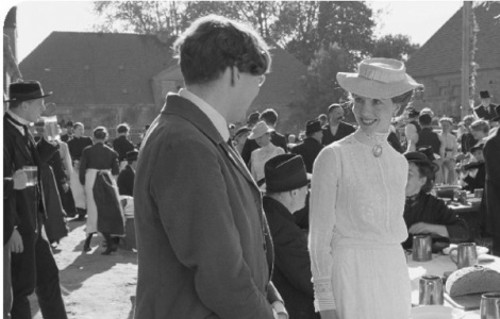The White Ribbon
Village of the Darned: The kids aren’t alright in Michael Haneke’s The White Ribbon—and neither is his grim moralizing
By Scott Renshaw @scottrenshawHaneke has made an art-house name for himself, after all, for being a provocateur moralist. Both his original and English-language remake of Funny Games implicated the audience in the playing out of pointless cinematic violence: Guilt, shame and people being forced to confront uncomfortable situations have been at the center of films like Code Unknown, Caché and The Piano Teacher. Haneke likes to place both his characters and his viewers in the position of examining their consciences, and asking “What does it mean that they’re doing horrible things … and that you’re watching them?”
At first glance, The White Ribbon seems to fit right into the Haneke gameplan. The time is 1913, and the setting is the small German Protestant town of Eichwald. A narrator, the town’s schoolteacher at the time (Christian Friedel), guides us through the unpleasant events that shook up the residents leading up to the outbreak of World War I. A clandestinely placed tripwire injures the town doctor (Rainer Bock) on a fall from his horse; Sigi, the young son (Fion Mutert) of the town’s principal landowner, the Baron (Ulrich Tukur), is beaten and tied up in a barn. Something’s not quite right in Eichwald—and as we begin to get a look behind the doors and windows of the homes, we start to get a sense of what it might be.
Or at least, we get a sense of what Haneke wants us to conclude that it is. Juxtaposed with the schoolteacher’s innocent courtship of Sigi’s young nanny (Leonie Benesch), we see harshness of various kinds in the townsfolk’s behavior.
The pastor (Burghart Klaussner) beats his children and forces them to wear the titular white ribbon to remind them of their failings; the widowed doctor molests his teenage daughter, and berates the midwife (Susanne Lothar) with whom he’s been having an affair; the death of a worker for the Baron is dismissed cruelly. These are a stern, unforgiving people, these smalltown Germans of the early 20th century.
And that time frame in particular is what makes it evident that Haneke is aiming for a big target. As it becomes ever clearer that the town’s young people are acting out the cruelty they see in their parents, The White Ribbon begins to turn into a kind of retroactive condemnation of whatever happened before Germany launched two world wars—a logically fallacious post hoc ergo propter hoc argument that a nation became savage on a global scale because of savagery on a domestic scale. Look at them sing in church, even as we know they’re about to kill millions over the next 30 years. Ah, the hypocrisy.
In fact, that point of view is really the only one that justifies Haneke’s two-and-a-half-hour epic scope, and Christian Berger’s stark black-and-white cinematography.
Virtually nowhere to be found is the puckish humor with which Haneke sometimes leavens his bleak visions, or the implication of audience voyeurism. This is a kind of drama in which the director hasn’t trafficked—one that simply allows you to watch with a wry headshake of superiority. And suddenly the fact that it impressed Oscar voters makes sense.
Haneke is too gifted a film stylist for The White Ribbon to be a complete waste of time. Many of his compositions are eerily lovely, particularly when underscored by narration describing them in colorful terms we can’t see ourselves. Individual scenes effectively manufacture improbable tension, with the use of natural light creating an uncomfortable obscurity. But as the narrative plods on, it insists at a self-importance that just doesn’t feel earned by its weak sins-of-the-fathers thesis. If this is a “nursery story,” it’s not in the appropriateness of the subject matter. It’s in the sense that it creates a simplistic allegory that doesn’t challenge its target audience all that much.
THE WHITE RIBBON
Christian Friedel, Burghart Klaussner, Rainer Bock
Rated R
Speaking of...
-
Robin Hood
We Wuz Robbed: Ridley Scott’s Robin Hood can’t deliver promise of a story behind the legend.
- May 12, 2010
-
Iron Man 2
Stark Contrast: Iron Man 2 leaves you wanting more of the guy who made the original fly.
- May 6, 2010
-
Drive-By Truckers
Cooley for President: The Truckers’ guitarist is more than just a sideman.
- May 5, 2010
- More »
More by Scott Renshaw
-
Faces of Salt Lake County book and portrait reception
Images and personal stories in a new book reveal local demographic diversity
- Apr 17, 2024
-
Feature film review: THE BEAST
A filmmaker's compelling ideas get a bit tangled in references to his creative influences.
- Apr 17, 2024
-
Film Reviews: New Releases for April 12
Civil War, Escape from Germany, Coup de Chance, Hundreds of Beavers, La Chimera, Sting
- Apr 11, 2024
- More »
Latest in Film Reviews
Readers also liked…
-
Power Plays
Two satirical comedies explore manipulations and self-delusions by those with power.
- Aug 31, 2022






